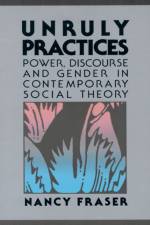- Power, Discorse, and Gender in Contemporary Social Theory
av Nancy Fraser
371
“A wonderfully rich and insightful collection of well-integrated essays on important current thinkers and social movements.” -Martin JayUniversity of California, Berkeley Unruly Practices brings together a series of widely discussed essays in feminism and social theory.┬á Read together, they constitute a sustained critical encounter with leading European and American approaches to social theory.┬á In addition, Nancy Fraser develops a new and original socialist-feminist critical theory that overcomes many of the limitations of current alternatives.┬á First, in a series of critical essays, she deploys philosophical and literary techniques to sort the wheat from the chaff in the work of Michel Foucault, the French deconstructionists, Richard Rorty, and Jurgen Habermas.┬á Then, in a group of constructive essays, she incorporates their respective strengths in a new critical theory of late-capitalist political culture.Fraser breaks new ground methodologically by integrating the previously divergent insights of poststructuralism, critical social theory, feminist theory, and pragmatism.┬á Thematically, she deals with varied forms of dominance and subordination in modern, industrial, late-capitalist societies - especially gender dominance and subordination; state-bureaucratic forms of organization; the institutional politics of knowledge and expertise; and the structure and function of social-welfare programs.┬á In the last section of the book, these themes are integrated in an original theory of “the politics of need interpretation.”┬á This concept becomes the linchpin of he socialist-feminist critical theory proposed in the last chapter.


























